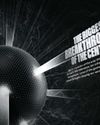
Combustion-engine vehicles are viewed as enemies of the environment and it’s easy to see why. By burning fossil fuels, every motorcycle, car, van and lorry adds to air pollution and contributes to climate change. It’s why governments are encouraging drivers to switch to more environmentally friendly electric vehicles (EVs). But while combustion-engine vehicles are an enemy in terms of emissions, they’re currently more of an ally when it comes to recycling.
The lead-acid batteries found in combustion-engine cars are easily and widely recycled, says Dr Daniel Reed, a lecturer in materials chemistry at the University of Birmingham. “Lead-acid batteries are the most recycled consumer product globally. [The technology is] mature and standardised so it doesn’t matter who makes your battery or which car you own because the battery conforms to certain regulatory specifications.”
The simplicity of lead-acid batteries also helps. They contain relatively few materials (lead for the electrodes, sulphuric acid for the electrolyte, and polypropylene to encase everything), each of which can be easily separated and sold.
The lithium-ion batteries used in EVs are almost the exact opposite.
“In a lithium-ion battery, you’ve got about 10 different components that are interspersed as tiny composite materials, as well as fluorinated polymers, fluorinated electrolytes and fluorinated solvents, all which are a complete nightmare to separate,” says Prof Andrew Abbott, a physical chemist at the University of Leicester.
この記事は BBC Focus - Science & Technology の July 2021 版に掲載されています。
7 日間の Magzter GOLD 無料トライアルを開始して、何千もの厳選されたプレミアム ストーリー、9,000 以上の雑誌や新聞にアクセスしてください。
すでに購読者です ? サインイン
この記事は BBC Focus - Science & Technology の July 2021 版に掲載されています。
7 日間の Magzter GOLD 無料トライアルを開始して、何千もの厳選されたプレミアム ストーリー、9,000 以上の雑誌や新聞にアクセスしてください。
すでに購読者です? サインイン

THE WORST IDEAS OF THE 21ST CENTURY
NOT ALL IDEAS CAN BE HITS. ALONGSIDE GROUND-BREAKING INNOVATIONS, 21ST-CENTURY SCIENTISTS HAVE HELMED THEIR SHARE OF WILD TECH FLOPS, DUBIOUS THEORIES AND OVERHYPED BREAKTHROUGHS. HERE ARE THE BIGGEST TO FORGET

10 IDEAS THAT WILL SHAPE YOUR NEXT 25 YEARS
Predicting the future is considered a fool's game. But it's one many of us like to play.

THE BIGGEST BREAKTHROUGHS OF THE CENTURY
We're a quarter of the way into the new century. To mark this milestone, we asked the UK's top minds to highlight some of the game-changing scientific breakthroughs shaping our world since the year 2000

DO THE SCIENCE COGNITIVE SHUFFLE
Trouble sleeping? A lot on your mind? Use this trick and sedate your synapses

WHAT DETERMINES HOW MANY ABS I CAN GET?
Assuming you're a human being, you have exactly the same number of abs as everybody else: two.

HOW CAN I IDENTIFY MY PSYCHOLOGICAL BLIND SPOT?
In the 1950s two American psychologists, Joseph Luft and Harrington Ingham, proposed a way of thinking about psychological blind spots - things you don't know about yourself - that they called the 'Johari Window' (the term is a combination of their first names).

How can I change my personality?
Want to become more confident, extroverted or assertive? Science shows that with a few simple changes, you can unlock your best self

Could your cosmetics be harming your health?
Cosmetic companies are phasing out microplastics and so-called 'forever chemicals' to help protect consumers.

extraterrestrial US Congress is talking about activity again. Is the truth really out there?
Despite several testimonies, the question remains frustratingly unanswered

Map of 100 million human body cells revealed
Over three dozen new studies mark significant milestone towards complete Human Cell Atlas